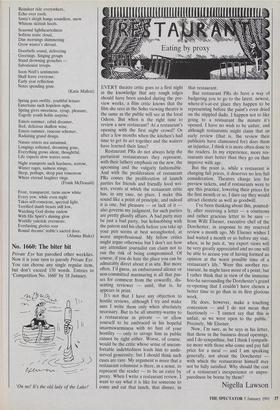Eating by proxy
EVERY theatre critic goes to a first night in the knowledge that any rough edges should have been sanded during the pre- view weeks, a film critic knows that the film she sees in the Soho viewing theatre is the same as the public will see at the local Odeon. But when is the right time to review a new restaurant? At a restaurant's opening with the first night crowd? Or after a few months when the kitchen's had time to get its act together and the waiters have learned their lines?
Restaurant PRs do not always help the parturient restaurateurs they represent, with their lathery emphasis on the new, the upcoming and the vulgarly fashionable. And with the proliferation of restaurant PRs comes the proliferation of launch parties for friends and friendly food wri- ters, events at which the restaurant critic has, in any case, no place. I make this sound like a point of principle, and indeed it is one, but pleasure — or lack of it also governs my judgment, for such parties are pretty ghastly affairs. A bad party may be just a bad party, but hobnobbing with the patron and his chefs before you take up your pen seems at best wrongfooted, at worst unprofessional. My fellow critics might argue otherwise but I don't see how any attendant journalist can claim not to run the risk of being compromised. Of course, if you do hate the place you can be admirably direct about it in situ. But more often, I'd guess, an embarrassed silence or non-committed murmuring is all that pas- ses for comment from the cowardly, dis- senting reviewer — until, that is, he appears in print.
It's not that I have any objection to hostile reviews, although I try and make sure I write them only when absolutely necessary. But to be all smarmy-warmy to a restaurateur in private — or allow yourself to be embraced in his hopeful smarmiwarminess with no hint of your hostility — only to savage him in public cannot be right either. Worse, of course, would be the critic whose sense of uncom- fortable indebtedness leads him to unde- served generosity; but I should think such cases are rare. My argument is more that a restaurant columnist is there, in a sense, to represent the reader — to be an eater by proxy. When I write a restaurant review, I want to say what it is like for someone to come and eat that lunch, that dinner, in that restaurant.
But restaurant PRs do have a way of badgering you to go to the latest, newest, where-it's-at-est place they happen to be representing before the paint's even dried on the stippled dado. I happen not to like going to a restaurant the minute it's opened. I have no wish to be unfair, and although restaurants might claim that an early review (that is, the review their publicists have clamoured for) does them an injustice, I think it is more often done to the readers. In my experience, more res- taurants start better than they go on than improve with age.
But the point is, while a restaurant is charging full prices, it deserves no less full consideration. Theatres charge less for preview tickets, and if restaurants were to ape this practice, lowering their prices for the first month or so, I dare say they would attract clientele as well as goodwill.
I've been thinking about this, pointed- ly, after receiving a letter — a courteous and rather gracious letter to be sure from Willi Elsener, executive chef of the Dorchester, in response to my reserved review a month ago. Mr Elsener wishes I had waited a month or so before my visit, when, as he puts it, 'my expert views will be very greatly appreciated and no one will be able to accuse you of having formed an opinion at the worst possible time of a restaurant's life.' Were this another res- taurant, he might have more of a point, but I rather think that in view of the immense hoo-ha surrounding the Dorchester's grand re-opening that I couldn't have chosen a better time to go than in its first glorious week.
He does, however, make a touching concession — and I do not mean that facetiously — 'I cannot say that this is unfair, as we were open to the public.' Precisely, Mr Elsener.
Now, I'm sure, as he says in his letter, that those in the business dread openings, and I do sympathise, but I think I sympath- ise more with those who come and pay full price for a meal — and I am speaking generally, not about the Dorchester with which the restaurateur himself may not be fully satisfied. Why should the cost of a restaurant's inexperience or unpre- paredness be borne by them?
Nigella Lawson










































 Previous page
Previous page